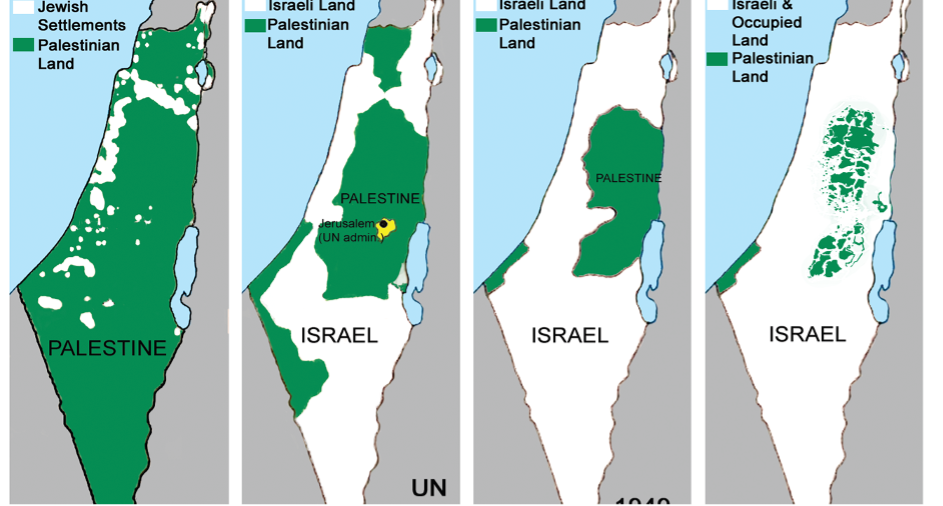
An Introduction
One dominant feature of the news cycle over the last 18 months has been the horrors unfolding in Gaza. This PRESC post aims to provide readers with an understanding of the historical reasons behind the conflict, which is essential to grasp why this territory on the eastern Mediterranean has been a source of anguish for nearly 70 years. As a quick point of information, and to dispel any misunderstandings: the God worshipped by Jews, Christians, and Muslims is the same. Large parts of each Holy Book, the Torah, Bible, and Koran contain the same stories. Jews refer to God using names such as YHWH (Yahweh), Christians typically call God "God" or "Lord," and Muslims call God "Allah," the Arabic word for God.
Any discussion of this conflict must begin with the importance of the city of Jerusalem (Al-Quds) to the three Abrahamic faiths (Judaism, Christianity, and Islam). For Jews, Jerusalem is the holiest city, home to the First and Second Temples, the centre of Jewish worship. It is the eternal capital of the Jewish people, and Jews pray facing the city. In Christianity, Jerusalem is where Jesus was crucified, buried, and resurrected. It contains the Church of the Holy Sepulchre, one of Christianity’s holiest sites, and is central to biblical events. For Muslims, the Al-Aqsa Mosque and Dome of the Rock stand on the Haram al-Sharif (Temple Mount), where Muslims believe Prophet Muhammad ascended to heaven during the Night Journey.
The Jewish Background
Our story begins over 2,500 years ago when the Romans expelled the Jews from what was then Judea/Israel. To erase any connection the Jews might have to the region, they renamed it Palestine. The displaced Jews migrated across Europe and the Middle East, forming a diaspora wherever they went. A defining feature of the Jewish diaspora has been the persecution Jews faced, notably on political, economic, and religious grounds. Anti-Semitism has political roots in scapegoating during crises, nationalism labelling Jews as outsiders and forcing them into ‘Ghettos.’ Leaders have used it to unite populations, justify persecution, and deflect blame.
Economic anti-Semitism arises from stereotypes about Jewish financial influence, often fuelled by restrictions that forced Jews into moneylending and trade. Resentment grew over their economic roles, leading to accusations of greed and control. During crises, Jews were scapegoated for economic downturns, with governments and elites exploiting these prejudices for political and social control.
Religious anti-Semitism stems from theological differences, particularly the Christian accusation of Jews' responsibility for Jesus' death. In Christian and Islamic societies, Jews were often viewed as heretics, leading to persecution.
The Rise of Zionism and the Balfour Declaration
The term ‘Zionism’ is likely known by many but understood by few. To clarify, Zionism was a movement officially started in 1897 by Theodor Herzl, aiming to provide a homeland for the Jewish diaspora in the land of Palestine. Jews believe this land is their homeland, promised to them by God. The rise of Zionism must be viewed in the context of the persecution Jews had faced across the world.
The Balfour Declaration, issued on November 2, 1917, was a statement by the British government expressing support for the establishment of a "national home for the Jewish people" in Palestine. It was seen as a significant step toward the creation of Israel but also sparked controversy and conflict. The Balfour Declaration was made for several reasons:
Support for Zionism: Britain sought to gain the support of Jews during World War I, particularly in influencing Jewish communities in the United States and Russia to support the Allied cause.
Strategic Interests: Britain aimed to strengthen its influence in the Middle East, particularly by securing control over Palestine, which was then part of the Ottoman Empire.
Sympathy for Jewish Aspirations: Some British leaders, especially Foreign Secretary Arthur Balfour, were sympathetic to the Zionist movement’s goal of establishing a Jewish homeland in Palestine.
The Balfour Declaration was controversial because it promised support for a Jewish homeland in Palestine without addressing the political rights of the Arab population living there. This led to tensions between Jewish and Arab communities in the region, contributing to long-term conflict. The declaration was seen as contradictory, as Britain also had commitments to Arab leaders regarding independence.
The Arab Background
After the Jewish expulsion by the Romans, the territory of Palestine came under Arab control. The journey began with the early Islamic conquests in the 7th century, notably marked by the Battle of Yarmouk in 636 CE, which decisively defeated Byzantine forces. Successive Islamic empires, such as the Umayyads, heralded a golden age of art and architecture, including the construction of the Dome of the Rock. The Mamluks played a vital role in protecting the region during the Crusades, while the Ottomans introduced administrative reforms and religious tolerance, ensuring continued control until the end of World War I. The collapse of the Ottoman Empire after the war led to Palestine being handed over to the British Empire as a Mandate in 1920, profoundly shaping the region’s geopolitical landscape and sowing the seeds of future conflict. Between 1920 and the end of World War II, tensions in the area were never far from the surface. Arab resistance to Jewish immigration and land purchases intensified, with widespread strikes and protests. The Arab Revolt against British rule and Jewish immigration heightened hostilities.
The Holocaust
Any discussion of the creation of Israel in 1948 must include the events of the Holocaust. Fuelled by pan-nationalism, a fear of communism, and deep-seated European-wide anti-Semitic ideas, Adolf Hitler and the Nazis implemented a systematic attempt to exterminate the Jewish population of Germany and its conquered territories. It is estimated that six million Jews were killed, primarily through the Einsatzgruppen and the gas chambers, with Auschwitz in Poland becoming the most infamous. The world was slow to react to the Holocaust due to limited early information, disbelief, and wartime priorities. However, as the horrors began to emerge (as an aside, the "Band of Brothers" episode ‘Why We Fight’ is a must-watch to understand the brutality of these camps), a global consensus formed that something had to be done to ensure such atrocities would never happen again. This played a crucial role in achieving the Zionist aim of establishing an Israeli homeland.
The Role of the UN
The horrors of World War 2 saw the creation of the United Nations. One of its first tasks wad to deal with Palestine issue. The UN Partition Plan of 1947 (United Nations General Assembly Resolution 181) proposed dividing British-controlled Palestine into two separate states, one Jewish and one Arab, with Jerusalem as an international city.
Key points of the plan:
Jewish State: 55% of the land was allocated to the Jewish state, despite Jews making up about one-third of the population.
Arab State: 45% of the land was designated for the Arab state, which had a sizable Arab population.
Jerusalem: The city of Jerusalem was to be administered internationally due to its religious significance.
The Jewish state was allocated land considered more economically viable and developed in the UN Partition Plan. While the plan granted Jews 55% of Palestine, this land included several key advantages:
Coastal and Mediterranean Access: The Jewish state had a long stretch of coastline, valuable for trade, commerce, and development.
Economic Areas: Much of the land allocated to the Jews included fertile agricultural areas in the coastal plain and valleys, which were economically productive and suitable for settlement.

The four maps above of Palestine are from the left: Pre-Partition, The Partition plan, Post Nakba and post 1967. The Green represents Arab land, White Jewish.
The Arabs rejected the UN Partition Plan of 1947 for several reasons. Firstly, they felt the allocation of 55% of Palestine to the Jewish state was unjust, as Jews made up only about one-third of the population, while Arabs were the majority. This led to a perception that the plan was unfair. Additionally, Arab nationalism and the desire for sovereignty played a significant role in the rejection, as Arabs believed they had the right to self-determination. Many also viewed Zionism as a colonial project, backed by Western powers, and opposed the creation of a Jewish state in Palestine. Arabs feared the displacement of Palestinian communities and the disruption of their way of life. Finally, the Arab leadership felt excluded from the decision-making process and was not adequately represented in the discussions that led to the plan’s proposal. These combined factors led to the widespread rejection of the partition and fuelled tensions and conflict in the region.
The Creation of Israel and the Nakba
It became clear that the Arabs would not accept the UN partition plan. Instead, on May 14, 1948, David Ben Gurion declared the new state of Israel. The next day, the Arab countries of Egypt, Jordan, Iraq, Syria, and Lebanon invaded to prevent the establishment of a Jewish state. Despite being outnumbered, Israel managed to defend its territory and even expand its borders. The war ended in 1949 with armistice agreements, leaving Israel with more land than originally allocated by the UN partition plan. This event became known in the Arab world as The Nakba, meaning "catastrophe" in Arabic. It refers to the mass displacement and suffering of Palestinians during and after the 1948 Israeli Arab War. Around 700,000 Palestinians were forced to flee or were expelled from their homes, never to return and becoming refugees. The Nakba is a significant and traumatic moment in Palestinian history and something that will be looked at in the next instalment of this history.
This ends Part One of the history of the Arab Israeli conflict. Next week, we will cover the aftermath up to the current war in Gaza. We here at PRESC hope you find this information interesting and useful as background to current events in the Middle East.
Main blog content here blah blah blah












